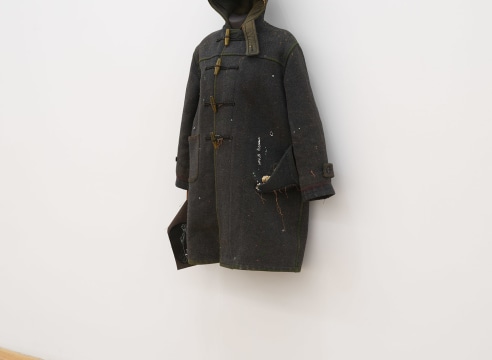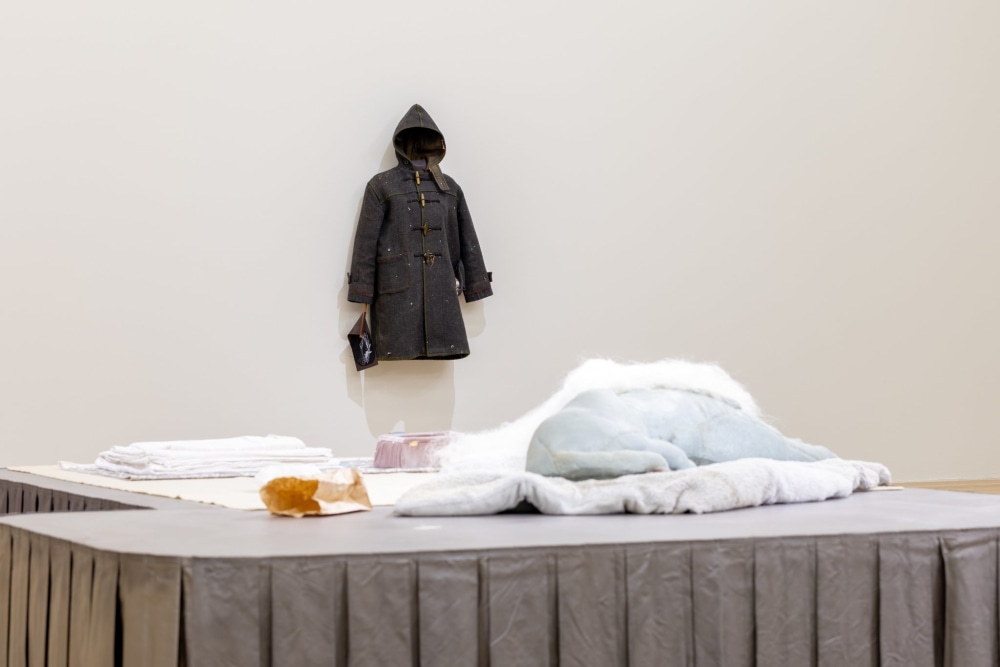

Titled The Rise and The Fall, the exhibition presents a focused selection of works produced over the last five years that explore our relationship with the material world, inviting us to examine the tension between attraction and disinterest. Magor transforms muted, everyday objects into active, concerned protagonists. Whether it’s a weathered coat, discarded toy, or empty sweet wrappers, the works are a recognition of the eloquence of materiality, allowing the items we accumulate and discard throughout our lives an opportunity to express their vibrancy.
The exhibition is organised by Focal Point Gallery in collaboration with the Contemporary Art Gallery, Vancouver and is presented in partnership with The Douglas Hyde, and Fondazione Guiliani in Rome. It will tour to Fondazione Giuliani this Autumn, opening on 27 October 2023 and running until 27 January 2024.
Magor divides objects into two categories “those that are provided by the world, and those that I provide by making them in the studio.” Using mould-making and casting processes she renders familiar objects in her studio into gypsum or rubber, combining them with objects that are found and/or gifted. She doesn’t actively search for these objects, they come into her possession as discarded items or through chance encounters. For example; finding a large, stuffed lion in a grocery store, which was cast in light blue rubber and is included in the work Coiffed (2020). Through a skilful play of materials, she reanimates objects, creating space for new roles, narratives and desires. Within Magor’s work, toys and stuffies are not fun or casual; they take on a new dimension, with their oversized eyes and shiny, flimsy packaging they become an alluring mechanism and reflection of our desires. In Delivery (Brown) (2018), Delivery (Sienna) (2018), and Oilmen’s Bonspiel (2017), the stuffies become ‘heroes’. Full of tension and action; they are at the centre of a chain of events.
In her exploration of things, Magor delves into the familiar relationship between garments and personal expression. She is not interested in the history of the people who owned the garments. Instead, Magor is curious about how these garments carry within them the stories of entire communities, evoking their customs, beliefs, social structures and values, and how this changes. The badged cardigan in Oilmen’s Bonspiel reflects on a time when fossil fuels were emerging in Canada and how its owner identified with this activity in a proud way, and just how controversial this might be now.
Wasted (2021) and Small Hand (2019) similarly reflect on the nature of what is kept and is discarded but also on our relationship with life and beauty and our desire to have it and own it. Each bird was part of a collection of antique, stuffed birds gathered in 1886 in Yucatán. Magor considers the energy and drive to collect them as well as the tragedy of having to destroy beauty in order to own it. These 100-year-old stuffed birds also serve as a reflection of the persistence of the objects that we cherish and collect. According to Magor: “we may discard things, but they don’t disappear. They outlive our desire, our interest, our use, and ourselves”. [1]
As critic Dan Adler has written, “[Magor’s] methods encourage me to slow down, wander about and listen to those neglected things, to understand their difference in their relationship to obsolescence- in ways that are analogous to the predicaments of people, or how they might struggle with desires, with compulsive and addictive behaviors and with the ideas of value, relevance and worth.”[2] The way in which Magor’s work draws attention to discarded and apparently mundane objects seems particularly relevant to current discussions about the economy of things and the role of material in our social, political and psychological lives.
[1] Focal Point Gallery. 2023. “Interview with Liz Magor” Produced and edited by Paul Bates and Gabrielle Milanese. https://www.fpg.org.uk/exhibition/the-rise-and-the-fall/
[2]. p.221. Adler, Dan. 2017. “Problematic Products: On Liz Magor’s Sculpture.” In Liz Magor, edited by Bettina Steinbrügge, Dan Adler, Heike Munder, and Lesley Johnstone. Berlin: JRP I Ringer.